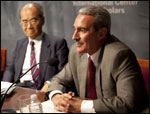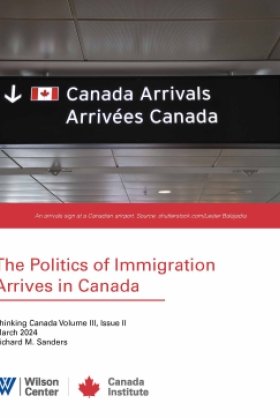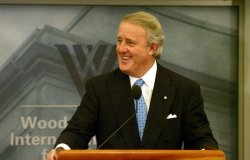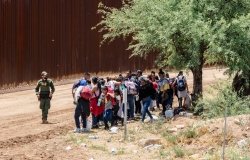The Future of the University/ Universities of the Future
Inwon Choue, President, Kyung Hee University, Korea; James Duderstadt, University of Michigan; Kiyofumi Kawaguchi, Chancellor, Ritsumeikan University, Japan; John King, Vice Provost for Strategy, University of Michigan; Koïchiro Matsuura, Former Director-General, UNESCO; William Pepicello, President, University of Phoenix
Overview
Inwon Choue, President, Kyung Hee University, Korea; James Duderstadt, University of Michigan; Kiyofumi Kawaguchi, Chancellor, Ritsumeikan University, Japan; John King, Vice Provost for Strategy, University of Michigan; Koïchiro Matsuura, Former Director-General, UNESCO; William Pepicello, President, University of Phoenix
This event was co-sponsored by Kyung Hee University and the following units of the Wilson Center: Program on America and the Global Economy; Science and Technology Innovation; and the United States Studies Program.
On June 21, 2010 the United States Studies Program of the Woodrow Wilson Center hosted a panel discussion on how an increasingly globalized and knowledge-based society will shape the future of universities. The first half of the discussion was moderated by Yersu Kim, Special Advisor to the President at Kyung Hee University in Korea, and the latter half was moderated by Sonya Michel, Director of United States Studies at the Woodrow Wilson Center.
Ryan Song, a professor of law at Kyung Hee, presented opening remarks that had been sent by Inwon Choue, the university's president. Choue stressed the importance of balance between the fields of applied sciences and the humanities. He pointed to an increasing tendency to neglect the humanities disciplines, especially in rapidly developing and globalizing nations like Korea, as evidence that the world is facing a "crisis of pure learning." While intellectualism that ignores a practical application of knowledge does inevitably stagnate, Song said, the humanities provide the valuable imagination, creativity, and human understanding that enrich the study of applied sciences. It is the task of universities to resolve the discord between pure and practical. According to Song, this responsibility has two main implications for the future of such institutions. Firstly, universities must constantly foster communication and cooperation between applied and theoretical disciplines. Secondly, universities must recognize their basis in society. The focus of their attention should be collective resolution of the problems societies face, and this task is best accomplished by creating a culture of fusion that can alleviate tensions between public and private interests.
Koichiro Matsuura, former Director-General of UNESCO, spoke on the changing role of universities in an increasingly globalized world. He first called attention to the difference in needs among developed and developing nations. While developed nations such as Japan and Korea see enrollment rates of 50 and 75 percent, respectively, in Africa, enrollment is as low as 5 percent. While discussion at this panel focused primarily on the future of universities in the developed world, it is important to keep in mind broader objectives as well. One such objective is the production of more globalized citizens at the university level. The increased interchange of students internationally, and the increased numbers of students seeking study abroad experiences, has prompted the Japanese government to set a goal of hosting 300,000 foreign university students by 2020, tripling current levels. Matsuura encouraged the U.S. to also accept more foreign students in the interest of promoting a more globalized citizenry.
James Duderstadt, President Emeritus of the University of Michigan and Director of the Millennium Project, examined the impact on universities of the evolution of knowledge-based societies. He began by listing the forces of change responsible for shifting needs in education. Among these forces was an emerging world system based in a knowledge economy, where the generation of wealth depends on the development and application of new knowledge. Another force mentioned was shifting global demographics, in which large aging populations are concentrated in the developed world, while an increasing number of youth in the developing world face limited opportunities for advancement. The response to these forces, predicted Duderstadt, will be a "skills race" analogous to the Space Race of the 1960s. There will be a need for mission differentiation among educational institutions to address the great diversity of higher education demands. Changing global forces could also force a massive restructuring in the way education is financed, along with shifting trends of public versus private investment. Duderstadt pointed to four entirely new paradigms that must be considered: lifelong learning, global universities, "meta" universities, and the possibility of a 21st century renaissance in technology and innovation.
John King, Vice-Provost for Academic Information at the University of Michigan, discussed the development of cellular telephony as an analogy to the trajectory that higher education will undergo. The advancement of information and communication technologies, he said, will put more and more power into the hands of the learner, just as cellular phones shifted the locus of productivity from operators to consumers. The switch in learning productivity will not be driven by the higher education sector which is stuck in what he calls a "utility-based model where people come to us [the universities] to receive services."
Kiyofumi Kawaguchi, President of Ritsumeikan University in Japan, spoke on the role that the globalization of commerce and culture will play in the development of universities' missions. As cultural diversity becomes an increasingly salient issue, curriculum must be altered to suit the mission of turning students into global citizens. Whereas in the past universities have served the purpose of creating a national identity among young people, this function will need to be revisited as students become more interested not in national identity, but local cultures. At the same time, an emerging trend of standardizing higher education somewhat threatens the opportunities for rich diversification in learning. While some level of standardization is necessary to ensure employment by international companies in need of local know-how, it is also important to uphold cultural diversity, in the interest of fostering global citizenry.

William Pepicello, President of the University of Phoenix, declared that U.S. higher education institutions are not addressing the needs of a demographically shifting population as well as they should be. Universities are not yet designed to engage the increasing number of older members of society. The fact that humans are living significantly longer lends new implications to lifelong learning, which must become increasingly personalized and individually relevant. At the same time, universities are missing an opportunity to deliver quality knowledge to the 73 percent of potential students who do not fit the mold of on-campus, full-time learners. As knowledge becomes increasingly accessible, students are expecting education institutions to likewise ease their modes of access and integrate more smoothly into students' own lives.
During the afternoon session of the panel, the speakers discussed the visions they have for universities of the future. Duderstadt spoke of the emergence of two possibilities: the global university and the "meta" university. The global university will increasingly define itself in the space of an international marketplace, and its focus will be on issues that go beyond national, regional, or institutional needs. He envisions a "consortia of universities" coming together to work on solutions to global problems such as climate change and societal inequities. The meta-university will depend heavily on the technology of a cyber-infrastructure, which he predicts will dwarf that which we have thus far experienced. He cited the OpenCourseWare Initiative, HathiTrust, social networking programs, and other forms of unconstrained knowledge-sharing, and peer learning as examples illustrating where the future is headed.
The speakers agreed that humanities disciplines will maintain an important place among universities of the future. The mission to produce global citizens will necessitate an understanding of cultural diversity, which is accomplished through a liberal arts education. Pepicello said that there needs to be recognition that history, art, psychology, and the other humanities disciplines are part of common life experiences and can be valuably integrated across subject matter.
King discussed universities' resilience as formal educational institutions, citing their unique role in the preservation of knowledge and their deep lore as explanatory factors. While new innovations will add to and alter the current activities of universities, these education centers are deeply planted social institutions that cannot be displaced. He predicts, rather, that the most wrenching change will be in the economic models of higher education institutions, because public funding will not be sufficient for the level of open source knowledge that the public will grow to expect. Dunderstadt added that he believes U.S. public policy does not currently do enough to ensure that American universities remain competitive in the emerging higher education space. He gave the example that the U.S. was the only major developed nation to cut down funding of higher education as a response to the financial crisis.
Pepicello described several models that will grant universities the ability to become more entrepreneurial. An internal model will focus on adopting better business strategies and, possibly, for-profit branches. Another approach, currently being implemented at the University of Phoenix, is the corporate partnership model, which has the goal of practical application of knowledge to solve partners' business-related problems. An inter-institutional model is exemplified by articulation agreements made with community colleges, which may add to efficiency of knowledge-delivery and the expansion of access to a diversity of education opportunities.
Speaking on the impact of emerging global trends on the profession of teaching, King said that large research institutions are essentially franchising institutions which traditionally judge professors on the basis of publication outputs and not necessarily on the quality of undergraduate instruction. He predicts that in the future, professors will need to become more responsive to the learning needs of students as universities compete, and traditional systems such as tenure will likely die out.
Documents & Downloads
Thank you for your interest in this event. Please send any feedback or questions to our Events staff.










